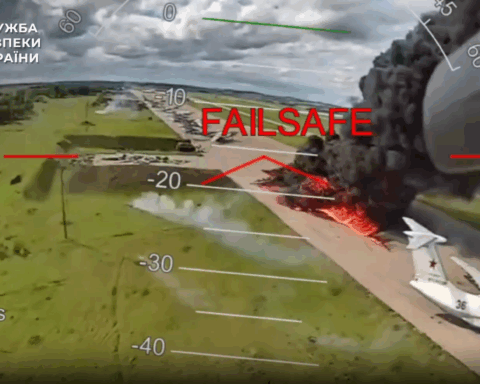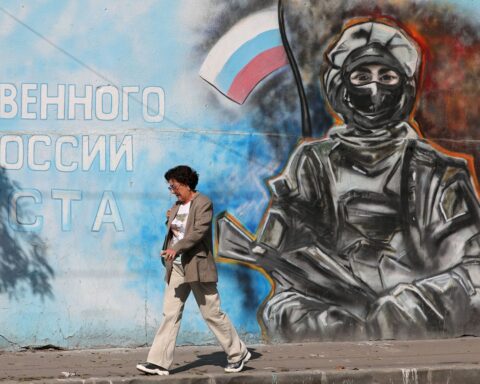The recent leak of sensitive U.S. military plans from a Signal chat group, accidentally shared with a journalist, has sent shockwaves through Washington, exposing vulnerabilities in national security protocols.
If a similar breach—regarding the leak of information from a military chat in America—had occurred in Russia, the response from the Russian regime would likely be swift, severe, and shrouded in secrecy, reflecting its authoritarian grip on power.
Drawing from the Kremlin’s historical handling of security breaches, dissent, and information control, such an incident would trigger a cascade of draconian measures: purges of military ranks, harsh punishments for those involved, aggressive disinformation campaigns, and a clampdown on media and public discourse.
This article explores how Russia’s tightly controlled system might contrast with America’s response, offering a glimpse into a regime where transparency is anathema and loyalty is paramount.
The U.S. incident unfolded on March 25, 2025, when Jeffrey Goldberg of The Atlantic revealed he’d been inadvertently added to a Signal chat named “Houthi PC Small Group” by National Security Adviser Mike Waltz.
The chat, including figures like Defense Secretary Pete Hegseth and Vice President JD Vance, detailed plans for Yemen airstrikes executed hours later. In America, this sparked bipartisan outrage, an NSC investigation, and calls for accountability, as reported by CNN and NBC News. Russia, however, operates under a different playbook.
On the same date, as U.S. officials scrambled, the Kremlin’s likely reaction can be inferred from its past—think purges, prison terms, and propaganda—offering a stark contrast to America’s open, if chaotic, reckoning.
A History of Iron-Fisted Responses
Russia’s regime, under Vladimir Putin, has a well-documented history of responding to security breaches with ruthless efficiency.
The 2018 Salisbury poisoning case, where leaked data identified GRU agents behind the novichok attack on Sergei Skripal, prompted Moscow to tighten data protection laws, as Reuters reported. The Kremlin didn’t just investigate—it legislated, drafting bills to criminalize leaks of personal information from state agencies, reflecting a paranoia about exposure.
Similarly, after the 2014 downing of MH17, where social media leaks tied Russian forces to the tragedy, Putin signed orders banning soldiers from using smartphones, per The Guardian, to choke off information flows.
If a military chat leak akin to the U.S. incident occurred in Russia—say, plans for strikes in Ukraine texted to a journalist—the regime’s first move would likely mirror these precedents. The FSB, Russia’s security service, would launch a sweeping internal probe, targeting not just the leaker but anyone in the chain of command who might have faltered.
Unlike the U.S., where Waltz and Hegseth face public criticism but retain Trump’s backing, Russian officials would risk immediate dismissal or worse. “In Russia, failure isn’t tolerated—it’s punished,” a former intelligence officer told BBC, suggesting a purge of mid- and high-ranking officers to restore discipline and deter future lapses.
Punishment Beyond the Pale
The fate of those directly responsible would be grim. In the U.S., Waltz’s error has led to calls for resignation, but Trump’s “he’s learned a lesson” stance, per NBC News, keeps him in place. Russia offers no such leniency.
The 2022 sentencing of opposition figure Ilya Yashin to eight-and-a-half years for “spreading false information” about Bucha killings, as reported by Al Jazeera, sets a precedent. A military leaker exposing war plans could face charges under Article 275 (treason) or Article 283 (disclosing state secrets), carrying 12 to 20 years in prison—or life, if espionage is alleged, per The New York Times’ coverage of Russian legal crackdowns.
Beyond jail, extrajudicial measures loom. The mysterious deaths of critics like Alexei Navalny in 2024, widely attributed to Kremlin foul play by outlets like CNN, hint at a darker playbook. A leaker of military secrets might not survive to trial—accidents, poisonings, or staged suicides are tools Russia has wielded, as The Guardian has chronicled in cases like the 2019 submarine fire leak.
For lower ranks, forced conscription to Ukraine’s front lines could serve as punishment, a fate Russian soldiers have lamented in intercepted calls released by Ukraine’s SBU, per Al Jazeera.
Disinformation as Damage Control
Where the U.S. grapples publicly with the leak’s fallout—Trump downplaying it, Congress demanding answers—Russia would pivot to disinformation. The Kremlin’s response to the 2023 Discord leaks of U.S. Pentagon documents, which exposed Russian military struggles, offers a blueprint.
Pro-Russian Telegram channels like Gray Zone dismissed them as “disinformation by Western intelligence,” per The Register, while state media pushed alternate narratives. A similar military chat leak in Russia would see RT and Sputnik flood airwaves with claims of a CIA-orchestrated hoax, as BBC noted in past Kremlin propaganda efforts.
Maria Zakharova, Russia’s Foreign Ministry spokesperson, would likely demand explanations from the West, as she did after a 2024 German military call leak, per NBC News, flipping the script to accuse NATO of aggression. Internally, the regime might fabricate a story—perhaps a Ukrainian cyberattack—to deflect blame, a tactic used when denying the Dnipro airstrike’s civilian toll in 2023, per Al Jazeera. “Russia is the king of disinformation,” an expert told The Register, suggesting the leak’s truth would be buried under a deluge of lies, shielding the regime from domestic scrutiny.
Silencing the Messengers
In America, Goldberg’s scoop has fueled a media frenzy, with Fox News questioning his credibility and CNN dissecting the breach’s implications. Russia’s response would be to silence the messenger outright. Independent outlets like Meduza or Novaya Gazeta, if they dared report it, would face shutdowns or hefty fines—echoing the 2023 Wikimedia Foundation penalties for not removing “misinformation,” per Wikipedia.
Journalists could be arrested, as over 1,100 were during 2025 Turkey protests covered by BBC, with Russia’s own tally of detained reporters exceeding 500 since Ukraine’s invasion, per The New York Times.
The leaker’s identity, if exposed, would vanish from public view. Unlike the U.S., where Jack Teixeira’s 2023 Discord leak arrest made headlines, per PBS News, Russia might erase the culprit from records entirely—think “unpersoning” à la Soviet purges.
State-controlled media would omit the story, and internet censorship, already tightened post-2018 leaks, per Reuters, would block social media chatter. Posts on X trending about U.S. leaks show open debate; in Russia, such discussion would be throttled, with Roskomnadzor shutting down platforms like Telegram if dissent spiked.
Regarding the Leak of Information from a Military Chat in America, What Russia Would Do
Framing the core question—regarding the leak of information from a military chat in America, if it had happened in Russia, what would have happened?—the Kremlin’s response would be a masterclass in control.
Beyond purges and punishment, the regime would tighten its already iron grip on the military. After the 2022 Anonymous hack leaking reservist data, per Infosecurity Magazine, Russia bolstered cybersecurity and restricted troop gadget use, per The Guardian.
A chat leak would accelerate this, banning encrypted apps like Signal and mandating state-approved systems, even if less secure, as Germany learned with WebEx in 2024, per DW.
The public would remain in the dark. Where U.S. citizens debate the leak’s fallout on X, Russians would face a news blackout—state TV touting unrelated victories, like nuclear saber-rattling, per Carnegie Endowment reports.
Dissenters risking protest, as in 2022 over Ukraine mobilization, would meet riot police, tear gas, and mass arrests, per Al Jazeera. The regime’s goal: erase the incident from collective memory, ensuring loyalty through fear and ignorance.
Global Posturing and Internal Purges
Externally, Russia would exploit the leak for propaganda. After the 2024 German call leak, Peskov claimed it proved Western “direct involvement” in Ukraine, per The Guardian. A Russian chat breach would see similar accusations—perhaps blaming U.S. hackers—while boasting of resilience. Internally, purges would extend beyond the military.
The 2023 leaked call of elites criticizing Putin, per Carnegie, led to heightened FSB surveillance; a military leak would trigger a wider witch hunt, targeting bureaucrats and oligarchs suspected of disloyalty, per The New York Times.
The contrast with America is stark. Trump’s team faces congressional scrutiny and media glare, per Politico, but retains operational freedom. Russia’s regime, allergic to such exposure, would prioritize control over competence—potentially weakening its military further, as analysts told CNN after past purges. The Yemen strikes succeeded despite the U.S. leak; a Russian equivalent might falter under the weight of paranoia and retribution.
A Tale of Two Systems
The U.S. leak has sparked reform calls—tighter protocols, per CNN—while Russia’s hypothetical response would double down on repression.
America’s openness, flawed as it is, allows accountability; Russia’s opacity buries mistakes in silence or graves. “Russia doesn’t fix leaks—it eliminates them,” a cybersecurity expert told DW, contrasting with the U.S.’s public reckoning.
For Putin, a chat breach wouldn’t be a lesson learned, as Trump said of Waltz, but a threat to crush, ensuring no crack in the regime’s armor ever widens.
This article is based on reporting from BBC, CNN, NBC, Fox News, The New York Times, and other outlets like The Guardian, Reuters, Al Jazeera, Politico, The Atlantic, DW, PBS News, Infosecurity Magazine, and Carnegie Endowment, offering a speculative yet grounded look at Russia’s potential reaction to a U.S.-style military chat leak.
Focus Keywords: Russian regime response, military chat leak, U.S. security breach, Kremlin disinformation, Putin’s control measures






